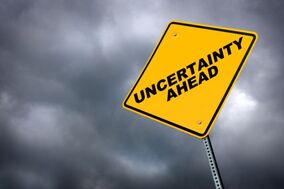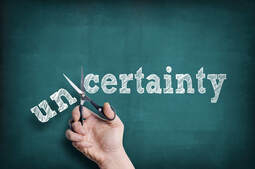
Many people seeking therapy, or who are in therapy, are very well aware of this, and the struggle to find meaning and strength in oneself that is such a part of their healing work. I've noticed a strong pattern in my own practice where people in therapy for trauma or anxiety are reporting that they had anticipated feeling very anxious about the situation, but in fact were remaining calm. In fact, they often report, they feel, for the first time in many cases, the most calm person they know! It's the result of those individuals having spent time and effort getting to know their own situation, and having skills and resources to draw on to deal with anxiety before it happens.
But what happens to otherwise healthy people when the social construct begins to collapse? That reality we're used to is for most of us, at the very least, reliable. It may be reliable in your favour, or reliably difficult to live in, but its constancy allows you to predict what may happen in various situations. We become reliant on it, used to it, habituated to its standards. And now it's been turned on its head. Things are now uncertain.

How do you know if how you're feeling is anxiety? You may feel physical effects, such as a racing heart, shortness of breath or quick shallow breathing, restlessness, feeling tightly wound and tense. Psychologically, you may feel unrealistic fear, obsessiveness, catastrophising thinking, endless "what if ... " scenarios that repeat and repeat to the point of being obsessive. You may also begin to withdraw, to find yourself avoiding people or situations to hide yourself away.
So how can you best deal with the uncertainty of the current situation?
- Acceptance - acknowledge that life is uncertain, and that any sense of control is as easily lost as the weather is changeable. Nice for those to whom this comes easily. For the rest of us, it involves sitting with our feelings around uncertainty, giving ourselves permission to feel uncertain, and knowing that it's normal for uncertainty to create anxiety. It's a built-in, hard-wired function of our bodies that gives us all sorts of physical and psychological reactions. It's amazing what some knowledgeable self-awareness can do!
- Self Compassion - acknowledge that you're human, and that as a human you're likely to be affected by uncertain times. They'll make you anxious, and can make you act in ways you prefer not to act. It's the classic "don't beat yourself up," and by forgiving yourself, by allowing yourself to be, you will find further freedom from the fear of uncertainty. Your response is natural, your awareness can put you in control again.
- Gratitude - make a point of seeking out those things that you're grateful for. The brain has a natural tendency - a bias - towards the negative (another survival trait) which is significantly provoked in a time of crisis. It can be made less harmless by acknowledging what you have - really noticing it - and being able to be grateful for it. This can in fact boost your mood with a dose of serotonin, and make you want more things to be grateful for with a hit of dopamine. It's a great way to hack your brain!
- Kindness - we humans are social animals and part of being social is the ability to make that society cohesive. One in-built mechanism we have is the desire to be kind, or to do things for others. Altruism of this kind makes us feel good because we're doing something that benefits all of us - we get rewarded in our brains, and the person we were kind to gets to be grateful. It's a nice little wheel that can spin back to reward us with another's generosity. And it makes the world a better place!
- Control what you can - being aware that there's little you can do to affect the outcome of Covid-19 except for sitting at home can make you feel like you have no ability to have an impact on anything. That's when you can focus on what it is possible to affect, and to do so. Be aware of your reactions to what's going on, and think on what you can and can't control. While you can accept that over which you have none, you can pinpoint those things that are within your world. Set yourself routines - get up at the same time each morning, get dressed for work (at least the top half) if working remotely, have meals at set times - that kind of thing. IN a household, set a time for everyone to de-stress from work and school, then at a certain time swap to fun things. Note how quickly you can adapt once you've set the new pace in your life.
- Know that it won't last! - look beyond now to the other side and imagine all the things you'll be able to do again, and with more appreciation of the small things!
It's quite remarkable how people are reacting to the current situation. Be aware of your own reactions, notice them, and work on the little things to help you maintain a sense of balance. I suspect people will be finding that it's the little, simple things that are actually most worthy of our attention.


 RSS Feed
RSS Feed